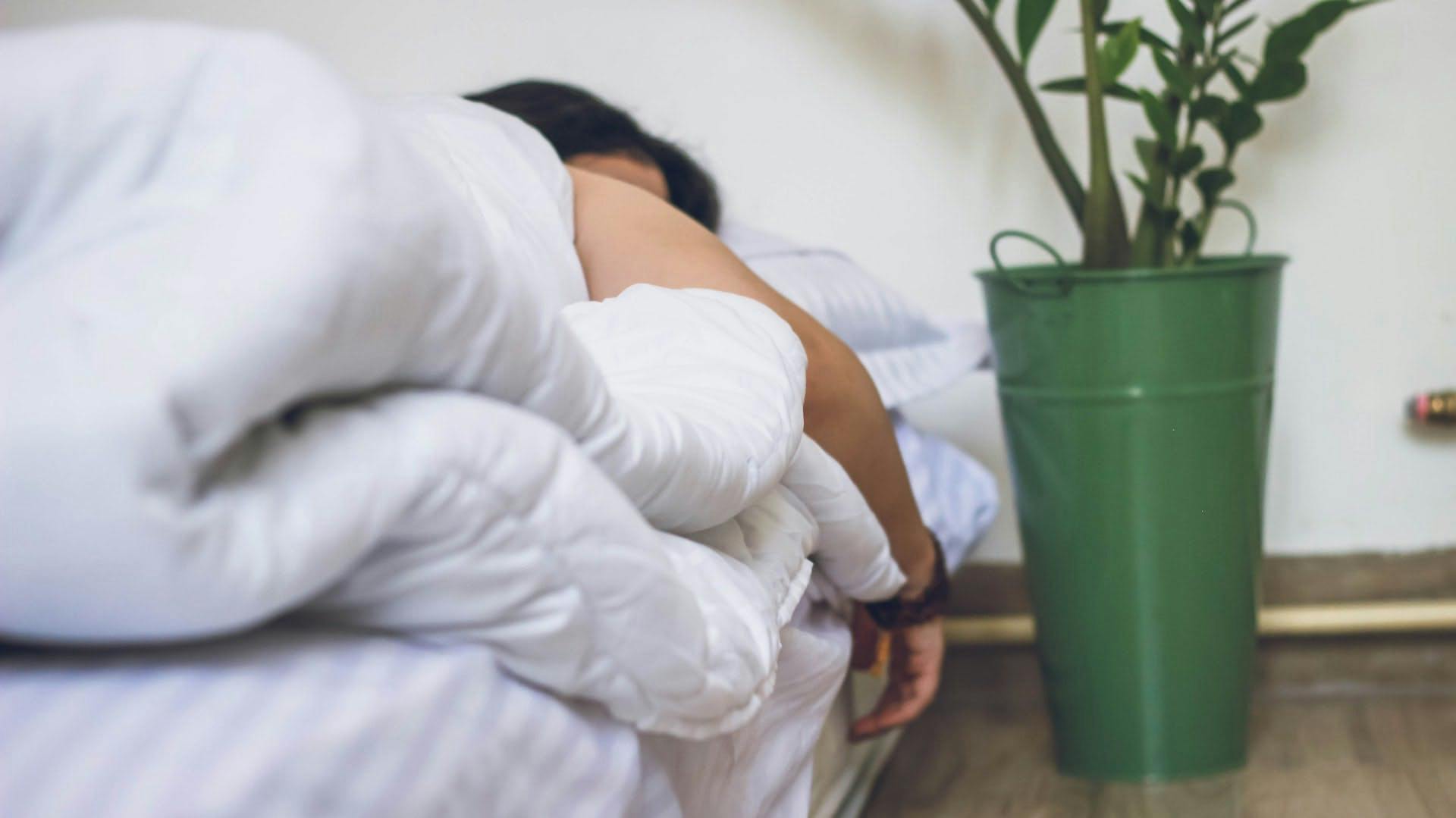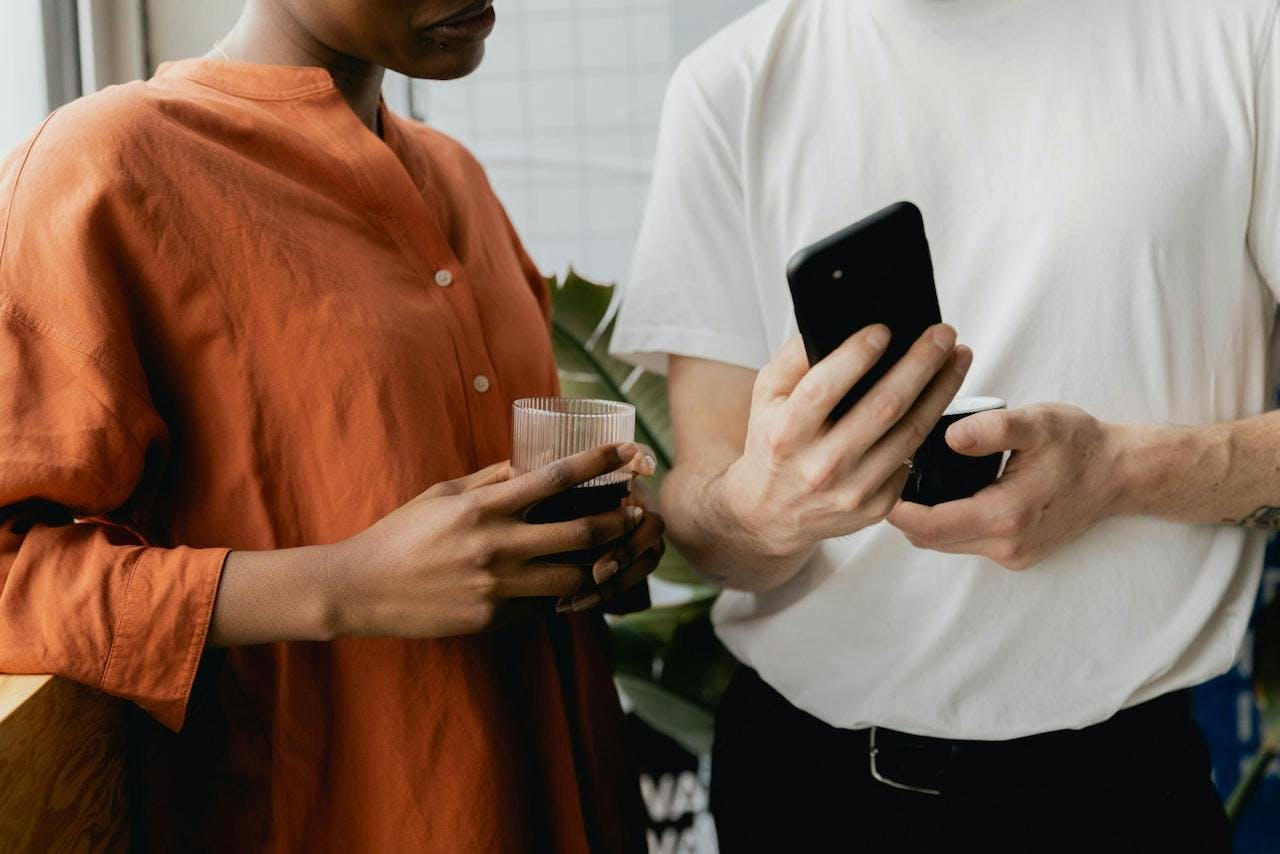Sleep is a form of fasting — your blood sugar levels naturally drop overnight as your body uses its glucose reserves to help you recover from the day. But what happens to your levels if you eat too late, drink alcohol at night, or sleep on your sensor? Learn exactly how your blood glucose fluctuates during each stage of sleep — and how your daytime activities can affect your levels and sleep quality.
What are the different sleep stages?
Human sleep involves two main sleep stages: nonrapid eye movement (NREM) and rapid eye movement (REM) sleep, which occur alternatively in cycles of around 90 minutes throughout the night.
Nonrapid eye movement (NREM)
Most of the night (75%, or 4-7 hours) is spent in NREM sleep [1]. NREM is broken into three stages:
- N1 (5% of total sleep time)
- N2 (45% of total sleep time)
- N3 (25% of total sleep time).
N3, the final stage of NREM sleep, is what people often call deep sleep. This deep sleep stage is when the body is least metabolically active and repairs tissues, releases growth hormones, strengthens the immune system, and makes other repairs [2].
Rapid eye movement (REM)
REM sleep, on the other hand, is lighter than NREM and brain activity increases, which is why REM is often characterized by vivid dreams, muscle atonia (i.e., our muscles are essentially paralyzed and we’re unable to move), and rapid eye movements.
What happens to glucose during sleep?
Glucose utilization changes through each stage of sleep.
When you climb into bed at the end of the night, your glucose levels will typically be within a healthy fasting range — between 70-100 mg/dL [3]. After you fall asleep, your glucose levels will naturally rise and fall throughout the night as your body releases glucose from the liver (which acts as a glucose warehouse during fasted states) to fuel repairs and other physiological processes.
There’s not much research regarding how much your glucose levels differ between sleep stages. However, preliminary research indicates that glucose levels are around 5% lower during REM sleep than NREM, which makes sense since brain activity during REM is comparable to daytime levels — meaning that your brain requires more glucose [4, 5]. Put another way, glucose uptake increases during REM to fuel your brain, resulting in a slight dip in blood glucose levels.
As you get closer to waking — between 4am to 8am — glucose is released from the liver to prepare your body for waking up and being active. This is why glucose levels tend to be higher in the morning, also known as the dawn phenomenon [6]. The dawn phenomenon may be why you wake up and are surprised that your levels are elevated, despite not having eaten yet [2]. But don’t worry — this is a normal physiological response, and your elevated glucose will level out as you begin to go about your day.
What does high blood glucose at night mean?
If your blood glucose is elevated overnight, there are a few things that might be causing this. One major contributor is meal timing, composition, and portion size.
Research shows that your bodies are more insulin resistant at night, as we wind down from the day [7]. If you eat a large meal or a meal high in fat and carbs close to bedtime, you may see elevated glucose levels throughout the night. High glucose levels can disrupt sleep, so it may be worth experimenting with earlier dinner times, and smaller portions for better rest [8].
Being sedentary can also affect nighttime blood glucose levels, so it’s important to get enough daily exercise. Evening exercise can improve sleep quality and has been shown to improve overnight glucose levels, so if you’re trying to achieve better sleep and better glucose levels, an evening workout may be the key [9, 10].
What does low blood glucose at night mean?
If you wear a continuous glucose monitor and notice some dips as you review your overnight glucose levels, don’t panic. There are a few common causes of glucose dips while you sleep.
Compression hypoglycemia
For non-diabetics who use a continuous glucose monitor, “compression hypoglycemia”, is a fairly common cause of overnight low blood sugar. Compression hypoglycemia occurs when a CGM is “compressed,” due to laying on the sensor during sleep (imagine the sensor is on your arm, and you’re laying on your side), and causes the sensor to give an erroneous low reading.
Studies have confirmed this phenomenon, and believe that the reason for the low reading on a compressed sensor is due to reduced blood flow to that area [11]. So if you sleep on the side of your body where your sensor is or tend to toss and turn, don’t be surprised if you see a dip or two on your glucose graph overnight.
Alcohol
You probably know firsthand that a night of drinking can negatively impact your energy levels and mood the next day. But research also shows that drinking alcohol can lower your glucose after a meal by 16-37% [12]. So if you’re drinking after dinner, or on an empty stomach before bed, you may experience lower-than-normal blood glucose levels at night.
But keep in mind that alcohol isn’t a solution for lowering nighttime glucose levels — studies show that alcohol before bed can lead to less restful sleep, impaired insulin sensitivity the next day, and a greater glycemic response to breakfast the next day [13].
In other words, your glucose — and body — will be feeling the effects of alcohol the following day!
Chronic conditions: PCOS and insulin resistance
If you have a chronic health condition, like polycystic ovarian syndrome (PCOS) or insulin resistance, you may be more prone to experiencing low blood glucose levels overnight.
One study in lean and obese women with PCOS found that 17% of participants experienced low blood sugar following a glucose tolerance test, compared with 0% in the control group [14]. So if you have PCOS and eat a dinner that creates a large glucose spike before bed, you may see low blood glucose overnight.
Insulin resistance is another condition where hypoglycemia may occur, even if you’re not diabetic. A 2011 review found that people who were at risk for or had insulin resistance experienced more frequent decreases in blood sugar levels [15]. This is likely because when you have insulin resistance, your body needs more insulin to lower blood glucose levels. When the insulin your body produces eventually catches up with high blood sugar levels, you can experience a crash, leading to hypoglycemia.
Do you have nocturnal hypoglycemia?
If you’re diabetic and use insulin and your blood glucose levels fall below 70 mg/dL (3.9 mmol/L) while sleeping, you may be experiencing nocturnal hypoglycemia. This is typically due to too much self-administered insulin. This condition can contribute to anxiety, neurocognitive deficits, and other symptoms if left unchecked — and can be dangerous [16].
If you’re not diabetic and are experiencing nocturnal hypoglycemia episodes (<70 mg/dL or 3.9 mmol/L) that wake you up from sleep with symptoms like shaking, sweating, or dizziness, you should consult your doctor.
Key takeaways
A good night’s rest can greatly impact your energy levels and glucose control. So what can you do to keep your sleep in an ideal state throughout the night?
Get attuned to your circadian rhythm.
- Get direct sunlight 0-2 hours of waking.
- Stop consuming caffeine after lunchtime.
- Engage in daily exercise.
- Aim to finish dinner 2-3 hours before bedtime.
- Darken your living space 2 hours before bed.
Prioritize sleep hygiene.
- Aim for low-carbohydrate, whole foods in the evening.
- Avoid screens 1 hour before bedtime.
- Stick to a consistent bedtime and wake-up time.
- Take a warm shower or bath before bedtime.
- Have the temperature around 60-67 degrees Fahrenheit.
Wear a CGM.
- Monitor your blood glucose levels during the day and night.
- Learn about your personalized responses to external factors like stress, foods, exercise, and sleep.
References:
- https://www.ncbi.nlm.nih.gov/books/NBK526132/
- https://www.ncbi.nlm.nih.gov/pmc/articles/PMC2929498/
- https://www.who.int/data/gho/indicator-metadata-registry/imr-details/2380
- https://pubmed.ncbi.nlm.nih.gov/19388962/
- https://www.health.harvard.edu/blog/shorter-dream-stage-sleep-may-be-related-to-earlier-death-2020091820932
- https://diabetes.org/diabetes/treatment-care/high-morning-blood-glucose
- https://www.ncbi.nlm.nih.gov/pmc/articles/PMC6167165
- https://pubmed.ncbi.nlm.nih.gov/25875738/
- https://physoc.onlinelibrary.wiley.com/doi/full/10.1113/EP087455
- https://link.springer.com/article/10.1007/s00125-021-05477-5
- https://www.ncbi.nlm.nih.gov/pmc/articles/PMC3879750/
- https://academic.oup.com/ajcn/article/85/6/1545/4632987
- https://link.springer.com/article/10.1007/s00125-021-05608-y
- https://academic.oup.com/humrep/article/31/5/1105/1750223
- https://www.karger.com/Article/Fulltext/322886
- https://www.ncbi.nlm.nih.gov/pmc/articles/PMC1994862/


